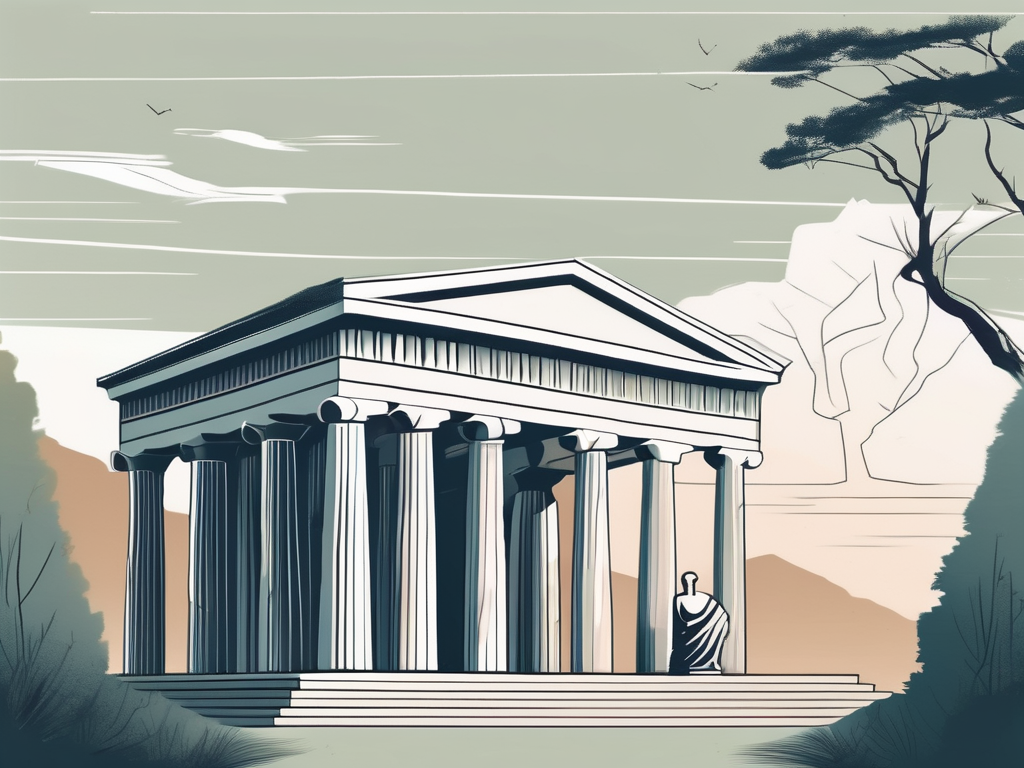Understanding the Core Principles of Stoicism
Stoicism, a school of thought that originated in ancient Greece, has gained renewed popularity in recent years. At its core, stoicism is a philosophy that teaches individuals how to live a good life filled with tranquility and virtue. The stoics believed that the key to happiness lies in accepting the things we cannot change and focusing on what we can control. Let’s explore the birth and evolution of stoicism, its key tenets, and the prominent philosophers who have shaped this philosophical perspective.
The Birth and Evolution of Stoicism
Stoicism was founded by a Greek philosopher named Zeno of Citium around 300 BCE. Zeno, a student of Crates of Thebes, was deeply influenced by the Cynic philosophy and Socratic teachings. He sought to create a philosophy that would help individuals find inner peace and live a virtuous life amidst the chaos of the world. Zeno’s teachings quickly gained followers and developed into a comprehensive philosophy over the centuries.
During the Hellenistic period, stoicism flourished and gained prominence in the Roman Empire. The stoics believed that virtue was the highest good and that individuals should strive to live in accordance with nature and reason. They emphasized the importance of developing one’s character, practicing self-discipline, and cultivating virtues such as wisdom, courage, and justice.
Stoicism found its way into the hearts and minds of many influential figures during the Roman period. Seneca, a prominent stoic philosopher, served as a tutor and advisor to the Roman Emperor Nero. He emphasized the importance of self-reflection and the pursuit of wisdom as a means to achieve tranquility and virtue.
Epictetus, another influential stoic philosopher, was born a slave but rose to prominence through his teachings. He focused on the power of our own thoughts and how we can control our perception of the world. Epictetus believed that true freedom lies in our ability to detach ourselves from external circumstances and find inner peace through the practice of stoic principles.
Marcus Aurelius, the Roman Emperor and author of the renowned work ‘Meditations,’ was also a devoted stoic philosopher. His writings explore the idea of embracing our fate and finding tranquility in spite of external circumstances. Marcus Aurelius believed that by accepting the impermanence of everything and focusing on our own character and actions, we can achieve a state of inner peace and live a virtuous life.
Key Tenets of Stoic Philosophy
Stoicism revolves around a few fundamental principles that guide its followers. The stoics believed in living in accordance with nature and reason. They saw nature as a rational and interconnected system, and individuals were encouraged to align their actions with this natural order.
Central to stoicism is the idea of developing one’s character and practicing self-discipline. The stoics believed that by cultivating virtues such as wisdom, courage, justice, and temperance, individuals can live a good and virtuous life.
Stoicism also places great emphasis on accepting the impermanence of everything. The stoics recognized that change is inevitable and that clinging to things beyond our control only leads to suffering. Instead, they encouraged individuals to focus on what they can control – their own thoughts, actions, and attitudes.
Another key tenet of stoicism is the pursuit of tranquility and inner peace. The stoics believed that by accepting the uncertainties of life and finding serenity within ourselves, we can achieve a state of tranquility that is not dependent on external circumstances.
Prominent Stoic Philosophers and Their Contributions
Several notable stoic philosophers have played a crucial role in shaping and spreading stoic philosophy. Seneca, as mentioned earlier, emphasized the importance of self-reflection and the pursuit of wisdom. He believed that by examining our own thoughts and actions, we can gain a deeper understanding of ourselves and live a more virtuous life.
Epictetus, with his teachings on the power of our own thoughts, emphasized the importance of controlling our perception of the world. He believed that our happiness and well-being are not determined by external events, but rather by how we choose to interpret and respond to them.
Marcus Aurelius, through his work ‘Meditations,’ provided practical guidance on how to live a stoic life. He explored the idea of embracing our fate and finding tranquility in the face of adversity. Marcus Aurelius’ writings serve as a timeless reminder of the stoic principles that can help us navigate the challenges of life.
These prominent stoic philosophers, along with many others, have left a lasting legacy that continues to inspire individuals to embrace stoic principles and live a life of tranquility and virtue.
Delving into the Depths of Nihilism
Nihilism, a contrasting philosophical perspective, takes a radically different stance on the meaning and purpose of life. Nihilists believe that life has no intrinsic meaning or value. They argue that there is no objective moral or existential purpose to our existence. To truly understand nihilism, let’s explore its emergence, core beliefs, and influential thinkers who have advocated for this philosophical perspective.
The Emergence and Development of Nihilism
Nihilism emerged as a philosophical concept in the 19th century during a time of significant social and intellectual change. The term ‘nihilism’ was coined by the Russian novelist Ivan Turgenev in his novel ‘Fathers and Sons.’ This marked the beginning of a philosophical movement that would challenge traditional beliefs and values. The idea gained further traction with Friedrich Nietzsche, who famously proclaimed that “God is dead” and challenged traditional moral values. Nietzsche’s works, such as ‘Thus Spoke Zarathustra’ and ‘Beyond Good and Evil,’ delved into the implications of nihilistic beliefs, sparking intense debates and discussions among scholars and intellectuals.
As nihilism continued to develop, it reached its peak during the existentialist movement. Existentialism, a philosophical school of thought that emerged in the 20th century, explored the individual’s experience and existence in an absurd and meaningless world. Philosophers like Jean-Paul Sartre and Albert Camus delved into the existential implications of nihilistic beliefs, further expanding the discourse surrounding nihilism.
Fundamental Beliefs of Nihilistic Philosophy
Nihilists reject the notion of inherent meaning or purpose in life. They argue that all values, including moral and existential ones, are ultimately arbitrary and subjective. Nihilism challenges traditional beliefs and institutions, encouraging individuals to critically question societal norms and constructs. According to nihilistic philosophy, individuals have the freedom to create their own meaning and purpose in an inherently meaningless world.
Furthermore, nihilism questions the existence of objective truth. Nihilists argue that truth is a construct created by human beings, and there is no ultimate reality or universal meaning. This rejection of objective truth leads to a skepticism towards established knowledge and a constant search for new perspectives and interpretations.
Influential Nihilistic Thinkers and Their Works
Several influential thinkers have contributed to the development and popularization of nihilistic ideas. Friedrich Nietzsche, known for his controversial works such as ‘Thus Spoke Zarathustra’ and ‘Beyond Good and Evil,’ explored nihilism as a profound challenge to traditional morality and religion. Nietzsche’s concept of the “will to power” emphasized the individual’s ability to create their own values and overcome the limitations imposed by societal norms.
Albert Camus, a prominent existentialist philosopher, delved into the absurdity and meaninglessness of human existence in his works ‘The Stranger’ and ‘The Myth of Sisyphus.’ Camus explored the human condition, emphasizing the individual’s struggle to find meaning in a world devoid of inherent purpose. His concept of the “absurd” highlighted the tension between the human desire for meaning and the inherent meaninglessness of existence.
Another influential nihilistic thinker is Friedrich Heinrich Jacobi, a German philosopher who critiqued rationalism and embraced a form of nihilism known as “nihilism of faith.” Jacobi argued that reason alone cannot provide a satisfactory explanation for the existence of God or the nature of reality. He emphasized the importance of faith and intuition in understanding the world, challenging the prevailing philosophical trends of his time.
These thinkers, among others, have contributed to the rich and complex discourse surrounding nihilism. Their works continue to inspire and provoke philosophical discussions, inviting individuals to critically examine the nature of existence and the search for meaning in an inherently meaningless world.
Comparing Stoicism and Nihilism
While stoicism and nihilism may appear to be polar opposites, a closer examination reveals some interesting parallels and contrasts between these philosophical perspectives. Let’s explore the similarities and differences between stoicism and nihilism to gain a deeper understanding of their implications.
Stoicism, an ancient Greek philosophy, teaches individuals to focus on what is within their control and to accept the things they cannot change. It emphasizes personal autonomy and freedom, encouraging individuals to cultivate inner peace and virtue. Stoics believe that by aligning their thoughts and actions with reason and virtue, they can achieve a state of tranquility amidst the chaos of the world.
Nihilism, on the other hand, is a philosophical perspective that challenges the existence of inherent meaning in life. Nihilists argue that life is ultimately meaningless and devoid of any objective purpose. Instead of seeking meaning in external sources, nihilists believe in embracing the absurdity of existence and the freedom to create their own values.
Similarities Between Stoicism and Nihilism
Despite their contrasting views on the nature of life and its meaning, both stoicism and nihilism emphasize the importance of personal autonomy and freedom. Stoics believe in focusing on what is within our control, while nihilists emphasize the freedom to create meaning in a seemingly meaningless world.
Both philosophies also encourage individuals to critically reflect on societal norms and question accepted beliefs. Stoics advocate for introspection and self-reflection to cultivate wisdom and virtue, while nihilists challenge conventional wisdom and encourage individuals to question the validity of societal norms.
Moreover, both stoicism and nihilism acknowledge the impermanence of life and the inevitability of suffering. Stoics believe that by accepting the transient nature of things and focusing on what is within their control, individuals can find inner peace. Nihilists, on the other hand, argue that the recognition of life’s inherent meaninglessness can liberate individuals from the burden of expectations and allow them to embrace the present moment.
Contrasts in Stoic and Nihilistic Views
While both philosophies share some commonalities, they fundamentally differ in their outlook and approach to life. Stoicism offers a framework for finding inner peace and virtue, emphasizing personal responsibility and the pursuit of wisdom. Stoics believe that by living in accordance with reason and virtue, individuals can lead a fulfilling and meaningful life.
On the contrary, nihilism challenges the existence of inherent meaning and encourages individuals to embrace the absurdity of life. Nihilists argue that the search for meaning is futile and that individuals should instead focus on creating their own values and finding personal fulfillment in a seemingly meaningless world.
Furthermore, stoicism places great importance on the cultivation of virtues such as courage, justice, and wisdom. Stoics believe that by embodying these virtues, individuals can navigate the challenges of life and find tranquility amidst adversity. Nihilism, however, does not prescribe any specific virtues or moral framework, as it rejects the notion of objective morality.
In conclusion, while stoicism and nihilism may seem like opposing philosophies, they both offer unique perspectives on the human condition. Stoicism provides a path to inner peace and virtue through personal responsibility and the pursuit of wisdom, while nihilism challenges the existence of inherent meaning and encourages individuals to embrace the freedom to create their own values. By exploring the similarities and differences between these philosophical perspectives, we can gain a deeper understanding of the complexities of human existence.
Practical Implications of Stoicism and Nihilism
Stoicism and nihilism have profound implications for how individuals navigate their daily lives and make decisions. Let’s explore the practical aspects of these philosophical perspectives and how they impact personal and social behavior.
How Stoicism Influences Daily Life and Decision Making
Stoicism offers practical tools for dealing with challenges and adversities. By accepting things outside of our control and focusing on what we can influence, stoicism encourages individuals to adopt a rational and balanced approach to life’s ups and downs. Stoic practices such as journaling, meditation, and practicing gratitude can help individuals cultivate resilience, emotional well-being, and a sense of purpose.
The Impact of Nihilism on Personal and Social Behavior
Nihilism challenges individuals to confront the inherent meaninglessness of existence and find their own purpose in life. This philosophical perspective can lead to personal liberation and the rejection of societal expectations and conventions. However, nihilism may also risk a loss of ethical grounding and nihilistic tendencies that dismiss the importance of empathy and compassion in interpersonal relationships.
Criticisms and Controversies Surrounding Stoicism and Nihilism
Both stoicism and nihilism have their fair share of critics and controversies. Let’s explore some common criticisms of stoic philosophy and controversial aspects of nihilism.
Common Criticisms of Stoic Philosophy
One common criticism of stoicism is that it can potentially encourage apathy and emotional detachment. Critics argue that excessive focus on indifference to external events may overlook the importance of addressing systemic injustices and act as a tool for emotional repression. Another critique posits that stoicism may undermine the value of subjective emotions and the richness of the human experience.
Controversial Aspects of Nihilism
Nihilism, with its rejection of objective meaning and values, faces criticism for its potential to undermine social cohesion and moral responsibility. Critics argue that embracing nihilism can lead to a disregard for ethical considerations and a nihilistic worldview that devalues human life and emotions. Additionally, nihilistic beliefs may inadvertently perpetuate feelings of hopelessness and existential despair.
Despite the criticisms and controversies surrounding stoicism and nihilism, both philosophical perspectives offer valuable insights into the human experience and provide frameworks for individuals to navigate the complexities of life. Whether we choose to find solace in stoicism’s emphasis on personal virtue and acceptance or explore the freedom of nihilism’s existential exploration, these philosophies compel us to question our assumptions and seek a deeper understanding of our place in the world.












